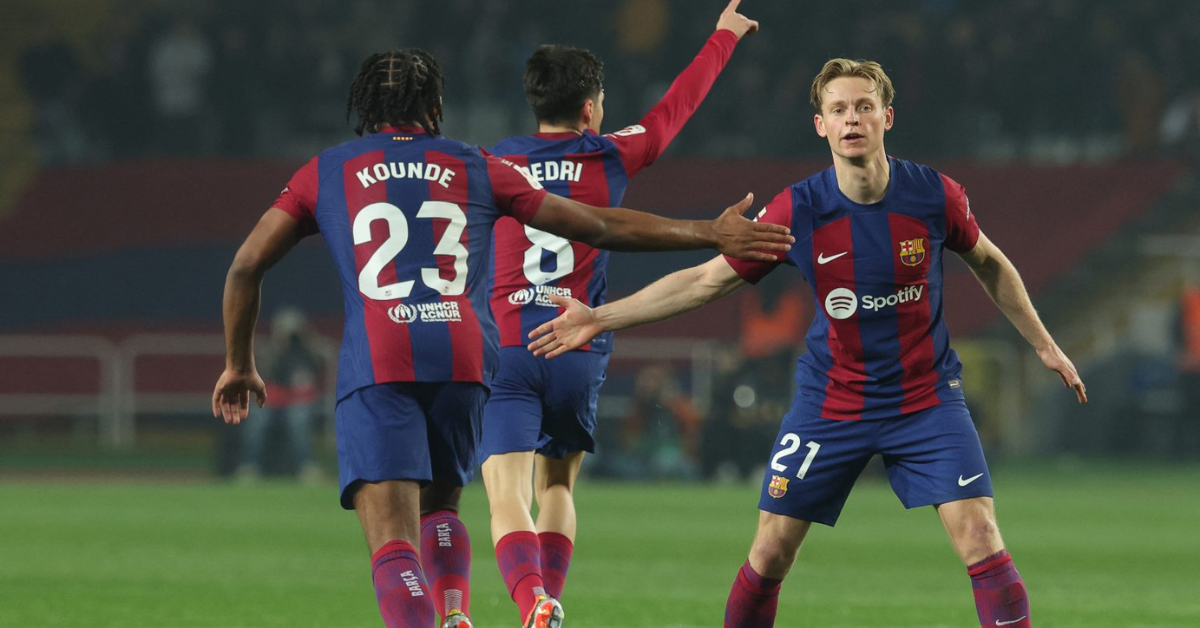Barcelona duo not willing to leave club due to their high salary
 Written by: Arjun Kapoor, Reviewed by: Sneha Reddy, Last Updated: April 26, 2024
Written by: Arjun Kapoor, Reviewed by: Sneha Reddy, Last Updated: April 26, 2024
As Barcelona prepares for a pivotal summer transfer window, the club finds itself facing a challenging task of offloading players to alleviate financial burdens while retaining key assets amidst high salary demands. The intricate dance of player sales and squad retention highlights the complexities of modern football economics and the strategic decisions faced by club management.

The Financial Imperative
Barcelona's financial landscape has been a subject of scrutiny in recent years, exacerbated by the economic impact of the COVID-19 pandemic and existing wage structures that strain the club's budget. La Liga's strict 1:1 rule, which limits club spending to match revenue, underscores the urgency for Barcelona to balance their books through player sales.
However, the reality of player valuation and market demand presents a formidable challenge. The club's ability to generate significant revenue from outgoing players is hampered by various factors, including loan obligations and the reluctance to part with key contributors.
Players on the Exit Radar
Among the players identified for potential exits are those currently out on loan, such as Clement Lenglet, Ansu Fati, Sergino Dest, and Eric Garcia. While their departure may not yield substantial financial gains, it represents a necessary step in restructuring the squad and reducing wage expenditure.
Balancing Retention and Financial Prudence
Despite the need to offload players, Barcelona remains committed to retaining pivotal assets integral to the club's future success. Players like Pedri, Gavi, Ronald Araujo, and emerging talent Lamine Yamal are deemed non-negotiable, reflecting the club's strategic vision and investment in youth development.
The De Jong Conundrum
Central to Barcelona's transfer considerations is the case of Frenkie de Jong. The Dutch midfielder, renowned for his technical prowess and midfield control, commands one of the highest salaries in European football—a reported €40 million gross per annum. This substantial wage demand presents a significant obstacle to potential suitors, limiting the feasibility of a transfer.
Reports suggest Barcelona's willingness to entertain offers upwards of €70 million for de Jong, contingent on his willingness to renegotiate his contract or pursue options elsewhere. Premier League clubs have shown interest in securing his services, while Bayern Munich remains a potential destination. However, the impasse primarily revolves around de Jong's salary expectations, which few clubs can match.
Xavi's Vision and Managerial Considerations
Amidst the transfer speculation, the role of manager Xavi Hernandez emerges as a pivotal factor. Xavi, who aims to shape Barcelona's future on the pitch, views de Jong as a cornerstone of his squad should he continue as manager beyond the summer. The manager's endorsement underscores the player's importance within the club's tactical framework and long-term strategy.
The Market Dynamics and Prospective Suitors
Navigating the transfer market requires a nuanced understanding of supply and demand dynamics. While de Jong's talents are coveted by top European clubs, his high salary poses a barrier to potential suitors. Premier League clubs, known for their financial resources, express interest, yet the feasibility of meeting de Jong's wage demands remains uncertain.
Bayern Munich, renowned for their astute transfer strategy, continues to monitor de Jong's situation. However, the Bavarian giants face similar challenges in reconciling financial constraints with player valuation.
A Delicate Balancing Act
Barcelona's summer transfer saga epitomizes the delicate balancing act between financial prudence and squad optimization. The club's pursuit of fiscal stability necessitates strategic player sales, yet the retention of key talents underscores a commitment to sustained competitiveness.
Frenkie de Jong's future exemplifies the complexities of modern football economics, where player valuation intersects with wage structures and market demand. As Barcelona navigates this intricate landscape, the club seeks to secure its financial footing while preserving its footballing identity and long-term aspirations under Xavi's leadership.
The forthcoming transfer window promises to be a defining chapter in Barcelona's journey, where strategic decisions will shape the club's trajectory and competitive standing in European football. Amidst uncertainties and challenges, Barcelona remains steadfast in its pursuit of success, both on and off the pitch, as the summer unfolds.
Most Popular
